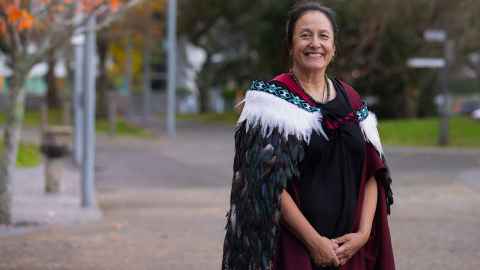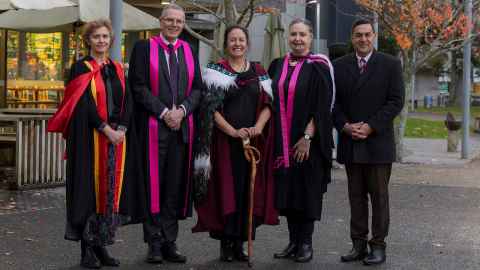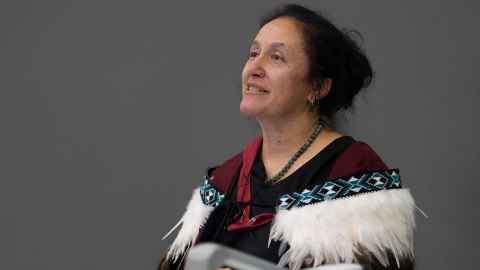Ancestors chart course for excellence
26 June 2025
Catching the waves of life has propelled Professor Matire Harwood to land on the shores of academic excellence – a story she told at her inaugural lecture as a professor.

A spine-tingling karanga summonsed Professor Matire Harwood, resplendent in a gleaming korowai, through the packed lecture theatre and onto the stage to deliver her inaugural professorial lecture.
Matire’s cousin, broadcaster Dr Julian Wilcox, offered a mihi that spoke of the intergenerational transfer of mātauranga, tracing the ancestral knowledge from the great navigator Kupe to their whānau today.
Julian set the scene for Matire’s 12 June inaugural lecture in the Faculty of Medical and Health Sciences at Waipapa Taumata Rau, University of Auckland, where Matire is deputy dean and now a professor.
Julian said: “Kupe’s moko, Nukutawhiti, used three tapu waves to travel to Aotearoa: Nui, the large wave that got the waka going, Roa, the long wave to sustain the journey, and Paewhenua, the wave that landed him on our shores.
“He landed in the Hokianga harbour and moved inland to settle our people as Ngāpuhi.”

Matire then spoke of her early life in Tautoro, south of Kaikohe, and later in Churchill, outside Melbourne, where her father took a job lecturing at an Institute of Advanced Education, rising to Dean of Arts.
“For our family, not going to university was not an option,” said Matire showing a photograph of her mother and brother graduating together.
The first big wave that set her direction in life was her grandfather telling her as a child that she would become a doctor.
“When your tohunga pāpā tells you to be a doctor, you have to follow suit,” Matire said, adding the whānau all got behind it, including her favourite auntie, Sue.
Matire excelled in science and entered medical school in a class famous for being the first with more than 50 percent women.
There were also a number of MAPAS students in her class including Rhys Jones, now an associate professor and prominent academic. They headed to Waitangi to protest and joined Ngā Tauira Māori which travelled around rural areas trying to promote university as an option for school students.
When your tohunga pāpā tells you to be a doctor, you have to follow suit.
Two lecturers lifted Matire’s heart. Professor David Tipene-Leach talked about SUDI (sudden infant death in infancy) or cot death and the pattern of victim-blaming of Māori whānau. His flax bassinet, wahakura, proved a game-changer, offering an affordable and appropriate means of keeping pēpi safe when bed-sharing.
Then, Professor Papaarangi Reid interwove politics and health in a way that inspired Matire to move to Wellington and work with her after graduating.
They were part of Otago’s School of Medicine at Wellington’s Te Rōpū Rangahau Hauora a Eru Pōmare, Māori research group.
Matire acknowledged the impact of Vera Keefe-Ormsby’s work which described the link between the wider determinants of health and well-being, and that of Bridget Robson in recognising the importance of Māori data quality and quantity.
“I would bring back the stories of unequal treatment that I saw in the hospital system, and I wanted to do something about that,” said Matire.
Around this time, Matire worked with Professor Richard Beasley who was delivering asthma management in marae, and with Professor Harry McNaughton, who encouraged her to consider a career outside of the hospital.
“So, in 2001, I left the hospital system and went into primary care,” Matire said. “It was an exciting time to do that, because the primary care strategy had just come out.
And it was all about community development and meeting local needs as determined by the community.”
Five years later, Matire had her first baby and moved back to Tāmaki Makaurau, Auckland to be near whānau.
She was invited to work as a GP at Papakura marae, where she had ‘the time of her life’.
“We were able to do so many innovative, original and caring things there, especially over the COVID-19 period. And, just like my dad, I dragged my kids along. When they decided to have the first vaccination programme at Papakura marae, I said, ‘Come on, son, we’re going for a drive.”
As well as ensuring vaccinations were available at the marae and on a bus that drove into local communities, Matire was a regular commentator in the media, speaking on the importance of vaccination and boosters, vaccine hesitancy, and informing vulnerable communities about changes to alert levels.

In 2024, she became a Companion of the King’s Service Order for services to Māori Health.
However, being an advocate for Māori came with a heavy personal toll.
“I would come to work on a Monday, and my email box would be full of trolling and vitriol.
“It was a really difficult time, and I am reluctant now, if I’m honest, to step into the media as much as I did then.”
Nonetheless, those experiences highlighted the need for advocacy and leadership for Māori and Pacific people who were not served well enough during the pandemic.
“In any crisis that occurs, the inequities that already exist are only exacerbated by those crises, whether it’s a pandemic, or financial recessions.”
That took Matire onto the next waves of teaching and research that saw her appointed as Head of the Department of General Practice and Primary Care then later Deputy Dean of the Faculty of Medical and Health Sciences.
“Anyone who has sailed a waka, it’s not a matter of getting on a big wave and going for ages. It’s about catching lots of little waves to help you be more effective and efficient,” said Matire, who includes waka ama in her list of achievements.
Her research wave started with a project around stroke in 1999, the same year her father had a stroke. She was involved in a project auditing stroke care and finding ethnic differences, which aligned with the experiences of her whānau.
Matire and her team designed an intervention to support Māori and Pacific peoples to take charge of their stroke.
It’s about catching lots of little waves to help you be more effective and efficient.
The intervention, which was by Māori for Māori, improved people’s physical ability 12 months after stroke, took the strain off the whānau and supported people to become more independent.
“My colleagues were a bit sceptical about this and asked if they could test it again with non-Māori and Pacific.”
But the intervention worked for everybody.
“That's been something that I've tried to convey in all the research that I do, that if we get it right for Māori, everyone's going to benefit.”
Matire did more research, including in other aspects of heart disease and diabetes.
In 2017, her research in support of equitable care won her the Aotearoa New Zealand L’Oréal-UNESCO For Women in Science fellowship. It was, she says, welcome recognition of the value of her studies, as well as a rare moment for her to wear makeup.
Research led to supervision, which is Matire’s great joy and where she carries a load that Professor Warwick Bagg, Dean of Medical and Health Sciences, described as “putting most of us to shame”.
Matire said: “I may take on too much but it’s because I just love seeing the future stars shine.”
Matire concluded with the hope her story has travelled across the waves to Hawaiki.
“I hope that three people in particular, my auntie Sue, my pāpā and my dad, have heard a story tonight that made them laugh, that addressed their curiosity about what's going on with my life, but more importantly, that showed their hopes for me have been realised.”
Media contact
Kaitohutohu Pāpāho Media Adviser, Te Mātauranga Hauora, Faculty of Medical and Health Sciences Jodi Yeats
M: 027 202 6372
E: jodi.yeats@auckland.ac.nz